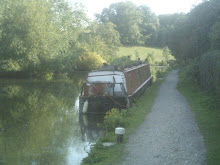Further to a comment on a previous posting, some thoughts on the BW complaints process.
Structurally, in terms of procedure, it has evolved to something that I for one say is quite acceptable. (I am biased cos I was one of the people who lobbied for it to be modernised!) In the bad old days, as recently as 2004, it was not so good and there was plenty of scope for BW to obfuscate. It was up to them to say when you had completed a complaint stage and many complaints would be held up for months. Many complainants gave up.
Under pressure from some complainants, frustrated by this loophole, and with support of the then Ombudsman, who noticed the frustrations over the length of time that BW had taken to process some of the cases that eventually came to him, the policy was modernised, becoming much more akin to other public sector complaints policies. Now there are in effect time limits and two as opposed to the previous three internal complaint stages. In effect if BW don't respond in a reasonable time, the complaint has to be accelerated to the next stage.
The Waterways Ombudsman is the final step in the most extreme cases. A look at the annual reports will reveal the range of issues that people pursue to that stage. (Whoever you were that offered a comment recently about the Local Government Ombudsman, this is why I didn't post that - there is a dedicated scheme for BW.)
However a frustration of the current scheme is that as it is an Ombudsman Service and not a waterways regulator, complaints that can be considered have to be procedural and the scheme does not generally offer a route to challenge policy decisions (see the Ombudsman's' terms of reference). That is not a fault in the scheme but a reflection of the fact that there is no effective parallel mechanism other than civil litigation by which individuals can challenge BW policy decisions or BW's interpretation of their legal powers.
A recent example of course is Mooring Tenders, BW's current policy of offering vacancies to the highest bidder. A case reported in most recent Ombudsman Report (No 336 for 2008/9) illustrates the point that BW has a lot of discretion about how it conducts consultations.
It is also true that generally the duty on BW is to carry out some sort of consultation. However final policy formulation is not a democratic process in most cases. The Mooring Tenders policy is a very good example of this. Although opposed by most user groups, BW went ahead with it anyway. (The User Groups' formal submissions to BW can be seen here under the heading BW long term moorings: allocating vacancies and setting prices)
Subscribe to:
Post Comments (Atom)


No comments:
Post a Comment